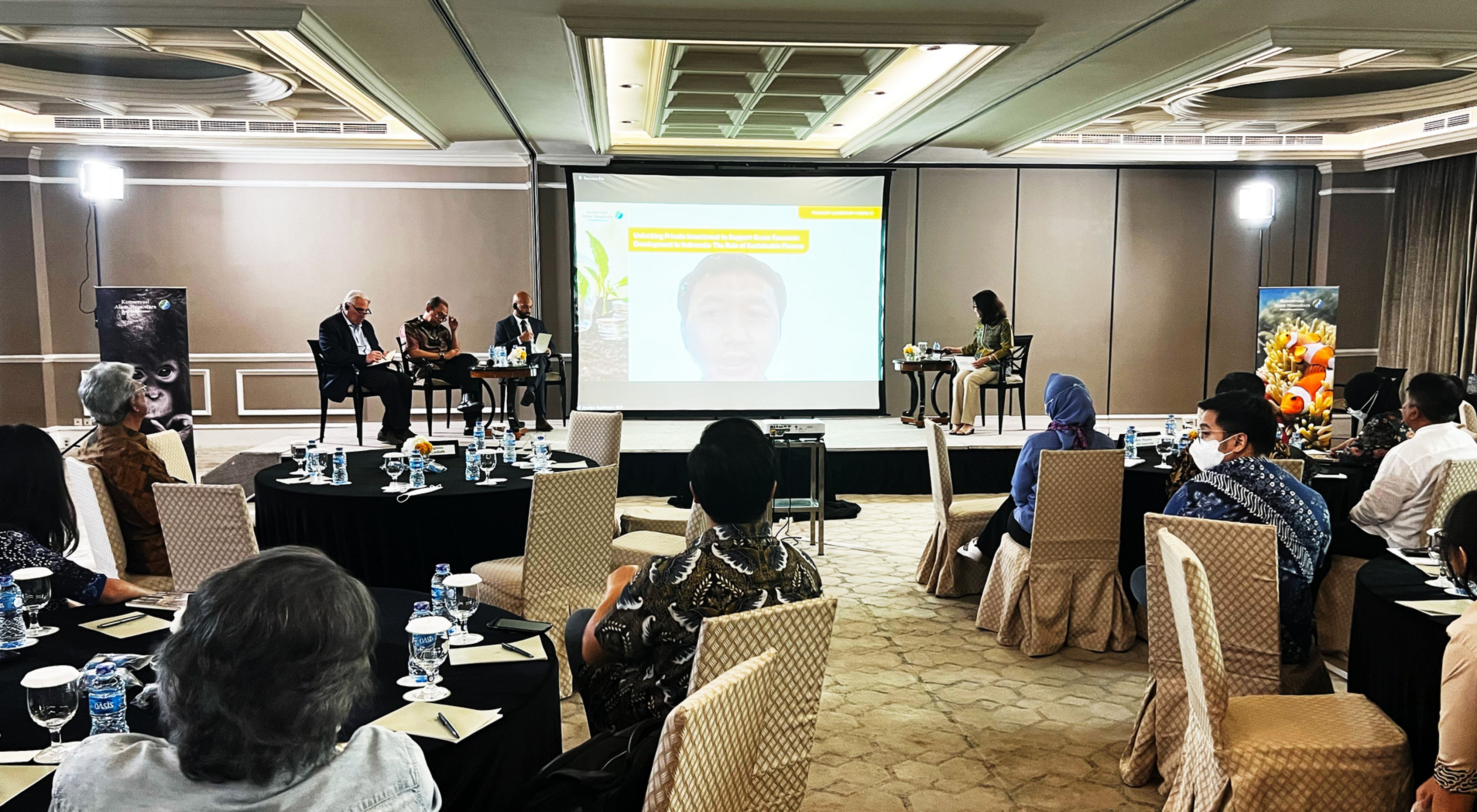Unlocking Private Investment to Support Green Economic Development in Indonesia: The Role of Sustainable Finance.
Based on the Nationally Determined Contribution (N.D.C.) Roadmap Document, Indonesia projects that the need for climate change mitigation financing to achieve the emission reduction target by 2030 will reach IDR 343 trillion yearly. However, the 2020 State Budget only contributes around 13% of the total mitigation fund requirements to achieve the N.D.C. target. For this reason, Indonesia needs to be able to mobilize funding sources outside the state budget, including private capital and philanthropy.
This was discussed in the "Thought Leadership Forum: Unlocking Private Investment to Support Green Economic Development in Indonesia: The Role of Sustainable Finance" by Yayasan Konservasi Alam Nusantara (YKAN) on Friday, March 24, 2023. This discussion presents by Expert Policy Analysts Young Fiscal Policy Agency Ayudya Rachman, S.E., M.S.E., MIDEc, Senior Financial Sector Specialist The World Bank Salman Alibhai, Head of Technical Assessment, Environmental and Social Safeguards P.T. Sarana Multi Infrastruktur Gan Gan Dirgantara, and Global Head Impact Finance and Markets The Nature Conservancy Matt Arnold.

To mobilize private funds, the government as a regulator has developed policies, strategies, instruments, and enabling conditions. A strategic approach is to have a Green Taxonomy as a classification system that determines a list of environmentally friendly economic activities. The application of green taxonomy will create security for investors. "Helping companies become more climate-friendly, reduce market fragmentation, and help shift investment where it is most needed." Ayudya Rachman said.
The role of international development agencies has also shifted to becoming a private funding mobilizer, risk reducer, and facilitator for implementing partners. On the same occasion, Senior Financial Sector Specialist of The World Bank Salman Alibhai described the approach taken by the World Bank in supporting green finance concepts that encourage environmentally friendly investment and sustainable development. Among them is through macroeconomic policies in Indonesia and various good practices that have been carried out in Vietnam and China.
Meeting the needs of climate change funding takes work. In this case, Indonesia is opening up funding internationally and cooperating with private partners and non-governmental organizations to support climate change mitigation policies jointly.
"To achieve the goal of green economic development, lenders must clearly explain the sustainability and program schemes that have a long-term impact based on reliable data. Multi-stakeholder collaboration can open up opportunities to accelerate program implementation to have a sustainable impact on nature and humans," said Matt Arnold, M.A., M.B.A., Global Head, Impact Finance and Markets, The Nature Conservancy.
P.T. Sarana Multi Infrastruktur (S.M.I.), a particular mission vehicle (S.M.V.) under the coordination of the Indonesian Ministry of Finance, is mandated to catalyze national development. S.M.I. supports development in Indonesia through its sustainable initiatives, particularly in addressing climate change issues and achieving sustainable development goals.
"This year, there have been 35 projects financed by S.M.I. The green development ecosystem has changed slowly; many banks and the private sector have allocated funds for green investment. In terms of challenges, in Indonesia, many financial institutions are still not implementing sustainability itself," said Gan Gan Dirgantara, Head of Technical Assessment, Environmental and Social Safeguard of P.T. Sarana Multi Infrastruktur (Persero).
"Joint discussions across sectors like this are urgently needed to unlock the potential and opportunities for partnerships to promote green economic development in Indonesia. We are only seven years away from achieving the zero-emission target. Joint work from all fronts is urgently needed to counteract climate change and improve people's welfare," concluded Herlina Hartanto, Executive Director of YKAN.
The different roles of different sources of finance in the investment cycle need to be better understood and implemented, and dialogue and coordination between key institutions have been intensified to remove obstacles and increase synergy to achieve the set targets.
Yayasan Konservasi Alam Nusantara (YKAN) is a scientific-based non-profit organization that has been present in Indonesia since 2014. With the mission of protecting lands and waters as life support systems, we provide innovative solutions to realize the harmony of nature and humans through effective natural resource management, prioritizing a non-confrontational approach, and building a network of partnerships with all stakeholders for a sustainable Indonesia. For more information, visit ykan.or.id.


